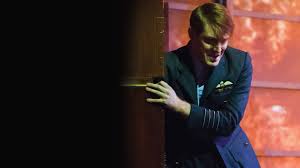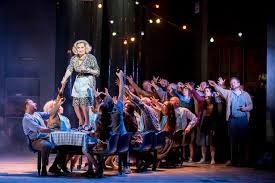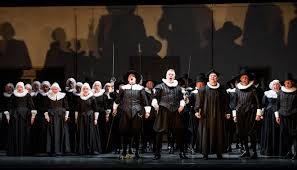As David Pountney notes in his introduction to this new season, Madness is possibly more endemic to opera than any other emotion. The three works which make up the autumn season focus on very different forms of madness but are none the less more closely connected than recent seasons, some of which have seemed somewhat fanciful in their linkage.
Handel’s Orlando, which I caught at the Bristol Hippodrome on 21 October, centres on the madness of the hero when confronted with the polarity of love and duty. Harry Fehr’s production moves the action to somewhere during World War II and a military hospital. Though this may seem too far from the mythical medieval realm of the original story it works remarkably well. Orlando, a fighter pilot, is seen dealing with the demons that war brings and the ensuing mental breakdown. The anonymity of a hospital, the almost surreal calm and staff going about their duties, ignoring the passion raging before them, makes sense both of the narrative and the intensely personal music which Handel provides. Arias are inner monologues rather than narrative devices and we have many glorious moments of intense beauty and – frequently – pain.
The production also highlights the importance of Dorinda, radiantly sung by Fflur Wyn. A staff nurse, she has little importance in the hierarchy but her sensitivity sees to the heart of the situation even when she herself loses by it. Her Nightingale aria at the start of act two was exquisite. But there were no weaknesses in the cast with Lawrence Zazzo a noble hero, Rebecca Evans ever so slightly snobbish as Angelica, but one whose pain we feel, and Robin Blaze a finely understated Medoro. The premise of the hospital is held together by the figure of Zoroastro, in this case the senior consultant, who guides his staff to allow nature to take its course. The only low voice in the cast he added a genuine gravity to the excesses of emotion around him.
There is no pit in the Birmingham Hippodrome which helps baroque works, though the orchestra under Rinaldo Alessandrini seemed larger than is needed to be. Not that this provided any lack of balance with its carefully moulded musical lines and the plethora of ornamentation coming from the stage.
The following night was the first of three performances of Sondheim’s Sweeney Todd. It is obvious that this is excellent box-office for WNO as the house was packed and enthusiastic. I have always liked Sondheim though we seem to have had rather a lot of Sweeney’s recently. While this was efficiently staged and well sung throughout I found myself wondering if the work was not somewhat more limited in scope than I had been led to believe. I have yet to see a production which gives me any real alternative insight into the characters. James Brining’s direction highlights the idea of madness by setting the opening in Bedlam and coming back to this on a number of key moments during the work, but they are hinted at rather than used. Maybe the whole evening could have been set within Bedlam – like the Marat/Sade – which would give another nuance to the text but, no, we were on very familiar ground. The containers which make up the set mirror the anonymity of the killings and a world in which things, and people, can be moved around unnoticed, but this did not impinge itself on the action as such.
Janis Kelly is as good a Mrs Lovett as one could wish for with a keen sense of humour as well as a real moral ambivalence. Other characters are more two dimensional, though Aled Hall makes a sleazy and nasty minded Beadle. In the lead, David Arnsperger looks good and sings well as Sweeney but never really convinces us that he is a drive man – close to the madness which is supposed to lie at the heart of the season.
Apollo Theatre, Oxford, 3 November 2015
Madness is even more at the heart of Bellini’s I Puritani than either of the other two works in this season, for the heroine goes mad in each act. This becomes the lynch-pin for Annilese Miskimmon’s production as Elvira is never really sane across the whole evening. Setting the naturalistic story line in Ulster during the troubles makes sense of the civil war and gives an added bite to what might be romantically historical. We start in a bleak church hall where the Orange Order are assembling for a parade. As Elvira descends even further into hallucination we drift back to the seventeenth century and the hall physically collapses around her. This is very effective and manages at all times to make sense of the libretto, even the rather startling line in act three where she refers to waiting for Arturo for over three centuries.
Linda Richardson has now taken over as Elvira for the remainder of the tour. She sings strongly and the top of the voice is secure but her presence is rather two-dimensional and lacking the emotional dynamism the part needs given that everything hangs on her. Alessandro Luciano was a late replacement for an indisposed Barry Banks as Arturo. As with Linda Richardson he has no problem with the tessitura for the part, which is certainly demanding, but he did little to win our affection or convince us that he is in emotional and political turmoil. Only David Kempster’s sterling performance as Riccardo really gave us the sense of power that the work as a whole needs if it is to be lifted out of the canary cage.
Happily the best part of the evening came from the orchestra under Carlo Rizzi. It is always a pleasure to welcome him back to the pit (not that there is one in Oxford) and his sensitive, often deft handling of the score was a delight the whole evening. There was also some very fine solo playing, particularly from the first horn.
WNO returns in the spring with three – yes three – Figaro operas.



